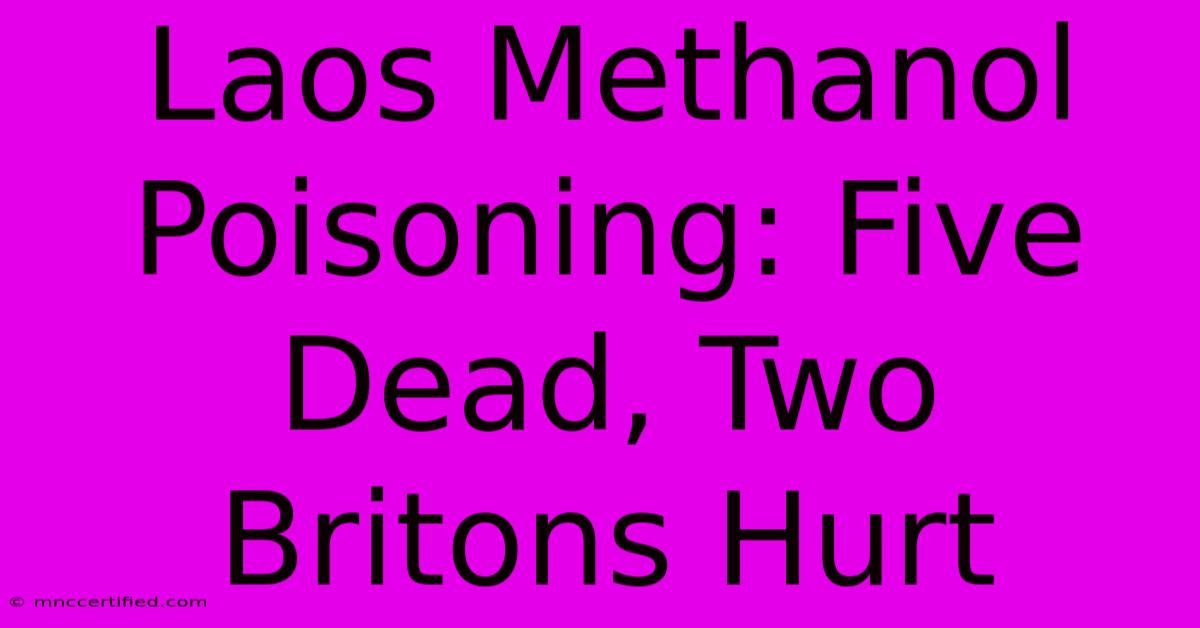Laos Methanol Poisoning: Five Dead, Two Britons Hurt

Table of Contents
Laos Methanol Poisoning: Five Dead, Two Britons Among Victims
A tragic incident in Laos highlights the dangers of unregulated alcohol consumption. Five people have died, and two British nationals are among the injured, following a suspected case of methanol poisoning in Laos. This devastating event underscores the critical need for increased awareness and stricter regulations surrounding alcohol production and sale in the region.
The Incident: A Devastating Loss of Life
The incident, reported earlier this week, involved a group of individuals who consumed locally sourced alcohol. Preliminary investigations strongly suggest methanol poisoning as the cause. Methanol, also known as methyl alcohol or wood alcohol, is a highly toxic substance that can cause blindness, organ failure, and death if ingested. Unlike ethanol, the alcohol found in regulated alcoholic beverages, methanol is not safe for human consumption.
The five fatalities highlight the potentially lethal consequences of consuming unregulated alcohol. The two British nationals, while seriously affected, are reportedly receiving medical treatment and are expected to recover. However, their experience serves as a stark reminder of the significant health risks involved.
Methanol Poisoning: Understanding the Dangers
Methanol poisoning is a serious medical emergency. The symptoms can manifest quickly and include:
- Nausea and vomiting: Early signs often include gastrointestinal distress.
- Headache and dizziness: Neurological symptoms develop as the methanol is absorbed.
- Blurred vision and blindness: Methanol's toxicity specifically targets the optic nerve.
- Abdominal pain: Severe abdominal discomfort is a common indicator.
- Shortness of breath: Respiratory problems can arise due to organ damage.
- Loss of consciousness: In severe cases, the victim can fall into a coma.
Early intervention is crucial for survival. If you suspect methanol poisoning, seek immediate medical attention. Treatment often involves administering fomepizole, an antidote that helps the body process methanol more safely.
The Role of Unregulated Alcohol Production
The incident in Laos underscores the significant public health threat posed by the unregulated production and sale of alcoholic beverages. Many countries, especially those with developing economies, lack the stringent regulations and oversight necessary to ensure the safety of locally produced alcohol. This often leads to the unintentional inclusion of dangerous substances like methanol.
This lack of regulation creates a market where consumers are unaware of the composition and potential dangers of the alcohol they purchase. Increased government oversight, stricter quality control measures, and public awareness campaigns are essential to address this ongoing issue.
Tourism and Safety Concerns
The involvement of British tourists in this incident highlights a crucial concern for travelers visiting Laos and other developing countries. Tourists should exercise extreme caution when consuming alcohol from unknown or unregulated sources. Stick to reputable establishments and brands to minimize the risk of methanol poisoning and other health concerns.
Looking Forward: Prevention and Education
The tragedy in Laos serves as a wake-up call. Addressing this issue requires a multi-pronged approach:
- Strengthening regulations: Governments must implement stricter regulations on alcohol production and distribution, including mandatory quality control measures.
- Public awareness campaigns: Education is key to informing the public about the dangers of unregulated alcohol consumption and the importance of choosing safe alternatives.
- International collaboration: International organizations and neighboring countries should collaborate to share best practices and implement effective strategies to combat this issue.
The deaths in Laos are a somber reminder of the devastating consequences of unregulated alcohol. The focus must now shift toward prevention and ensuring the safety of both locals and tourists alike. Only through concerted efforts can we hope to prevent similar tragedies from occurring in the future.

Thank you for visiting our website wich cover about Laos Methanol Poisoning: Five Dead, Two Britons Hurt. We hope the information provided has been useful to you. Feel free to contact us if you have any questions or need further assistance. See you next time and dont miss to bookmark.
Featured Posts
-
Does Car Insurance Cover Lawsuit
Nov 22, 2024
-
Dental Insurance For Gum Disease
Nov 22, 2024
-
Lsu And Michigan Nil A Side By Side
Nov 22, 2024
-
Ken Reid Passes Away Family Finds Solace
Nov 22, 2024
-
Coleen And Rooney Competing Tv Shows
Nov 22, 2024